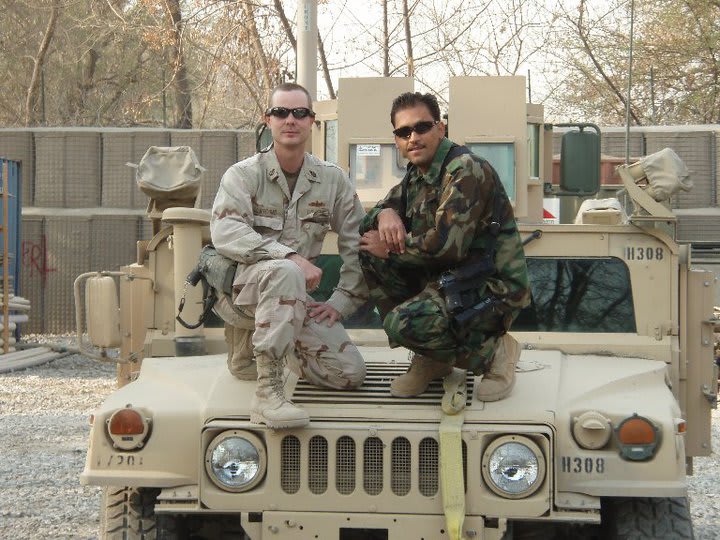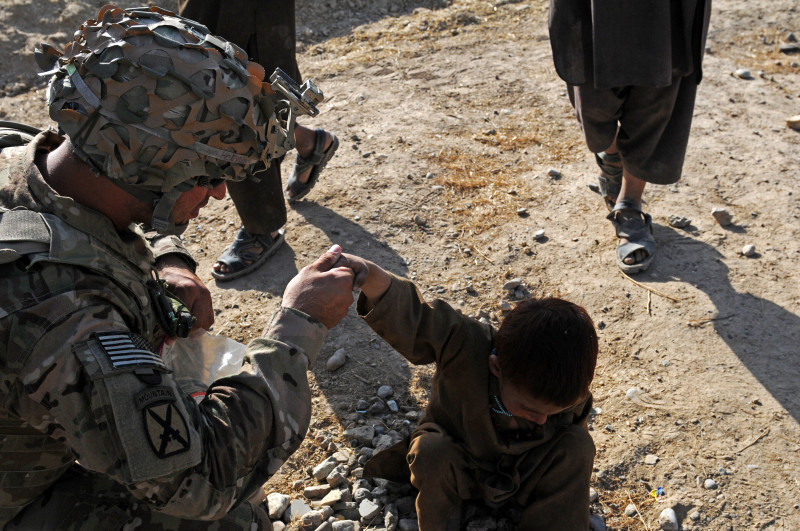Many Were Left Behind

U.S. Soldier with Afghan American interpreter
In 2001, when President Bush launched Operation Enduring Freedom in response to 9/11, there were less than 20 Afghanistan language experts in the entire U.S. foreign policy chain of command. To fill this vacuum, the U.S. military lured Afghan American civilians with six figure salaries to leave their comfortable homes in San Diego and Virginia to help with their mission to find and eliminate terrorists. This proved to be costly and at times ineffective since the majority of Afghan Americans recruited no longer had the on the ground knowledge or connections needed to infiltrate certain communities. Over time local Afghans were recruited at a fraction of the pay, with little benefits as foreign contractors, but they proved to be more effective operatives due to their in-country knowledge.
At the height of the war in 2011 where 110,000 American soldiers were deployed, the ratio of Afghan contractors—interpreters, translators, advisors, fixers, cultural experts, drivers, security guards, construction workers, power brokers—to American soldiers was 1:1. The contractors put an Afghan face to the war, allowing the U.S. to double its reach without the economic and political cost of deploying more American troops.
Although some Afghans considered anyone who worked with the Americans as watan foroosh (traitor) many young Afghans joined the U.S. mission for ideological and economic reasons. It’s one thing to have a gossipy neighbor call you watan foroosh or lose a marriage prospect due to your line of work, but it’s another thing to become the target of extortion, kidnapping, and death threats, which is what many Afghans faced as a result of helping the American agenda. The stakes were high for Afghans who at the end of their contracts had to go back to their village, most often controlled by insurgents, while their American counterparts returned to the safety of their homes in America.
The following quote in a Washington Post article illustrates how indispensable Afghan contractors were to their American counterparts.
“Every house we went into, he went into. Every firefight we went into, he went into,” said Lt. Matt Orr, who worked with his translator, Naseri, in one of the most dangerous corners of eastern Afghanistan.
Lt. Orr said he was baffled when Naseri was denied a visa.
The bond between the Afghans and their American counterparts grew as Afghan translators proved their loyalty and bravery on the battlefield and the military motto of “No man left behind,” became their mantra. Also, The Afghan Allies Protection Act of 2009, an immigration program, authorized the issuance of Special Immigrant Visas (SIVs) to eligible Afghans who were employed by or on behalf of the U.S. government. The program was designed to show appreciation and provide protection to those who fought alongside the Americans. The sense of ‘we’re in this together’ was further reaffirmed.
“For many years I could not leave my house unless it was with a scarf wrapped around my face to hide my identity.” SIV recipient (March 2021).
Unfortunately, the ill-conceived and executed SIV program was plagued with many political, logistical, and administrative problems. Noah Coburn’s report,The Costs of War based on interviews with 150 SIV applicants, highlights a slow, complicated, opaque, and costly ($800 per family medical examination) application process. Many Afghan SIV candidates had to wait months, if not years before their paperwork was processed. More often than not, the applicants faced further delays if their letters of recommendation were not precisely worded or if their Statement of Threat was not dangerous enough. Applicants were often denied a visa without an explanation, so the applicants turned to unscrupulous brokers for advice and coaching.

Afghan translator lends a helping hand to an Afghan boy.
Another contributor to the inefficiencies of the SIV program were shifting policies and political motivations in Washington D.C. which affected the speed and the number of visas approved. For example, American generals realized that the short deployment schedules of U.S service people created an information vacuum making Afghan translators invaluable for their institutional knowledge. In 2010, the U.S. Ambassador to Afghanistan, Karl Eikenbery, wrote to Hillary Clinton, then secretary of state, that the SIV program was an issue for the US mission. “This act could drain this country of our very best civilian and military partners: our Afghan employees. If we are not careful the SIV (Special Immigrant Visa) program will have a significant deleterious impact on staffing and morale, as well as undermining our overall mission in Afghanistan. Local staff are not easily replenished in a society at 28 percent literacy.” It’s reported that this comment slowed down the flow of SIV applicant approval which was already in a dire state of inefficiency which illustrates how the Afghan interpreters were collateral damage in this war.
And a few years later the Trump administration, in an effort to reduce the number of immigrants coming to the U.S., added further restrictions to SIV eligibility and diverted resources away from all immigration programs. More vetting, screening and less staff, caused the SIV program to almost come to a halt causing a backlog of 19,000 applicants by 2020.
“There are tons of Talibs in my village, and they all know that I worked with the Americans,”said one interpreter, Mohammad. “If I can’t go to the States, my life is over. I swear to God, one day the Taliban will catch me.”
The U.S. invasion and occupation of Afghanistan for over two decades has spanned four administrations—two republican presidents and two democrats. The spectacular debacle of the U.S. withdrawal followed by the collapse of the U.S.-backed Afghan government and the subsequent takeover of Afghanistan by Taliban forces was a catastrophe that unfolded in front of the world in August of 2021.
It is not clear why the Biden administration did not fast-track the evacuation of our Afghan allies when he announced in April of 2021 that he would uphold President Trump’s agreement with the Taliban and leave Afghanistan by that year’s anniversary of 9/11. But what is clear is that there are thousands of Afghans who have been arrested, killed, and are in hiding because of the help they provided to the U.S. mission. Nowadays, Afghanistan is rarely covered in the news, but many of us, Afghans, in the diaspora still receive desperate pleas for help from Afghans who were left behind.
You can find out more about the author, Humaira Ghilzai, on her website: humairaghilzai.com.
Sources:
The Costs of War paper by Noah Coburn, Watson Institute International and Public Affairs Brown University
Special Immigration Visa for Foreign Interpreters by Ryan Crocker, Carnegie Endowment for International Peace
In Afghanistan, interpreters who helped U.S. in war denied visas; U.S. says they face no threat by Kevin Sief, The Washington Post
Former US interpreter worry Taliban will arrive before visa does by Heath Druzin, Stars and Stripes, online platform